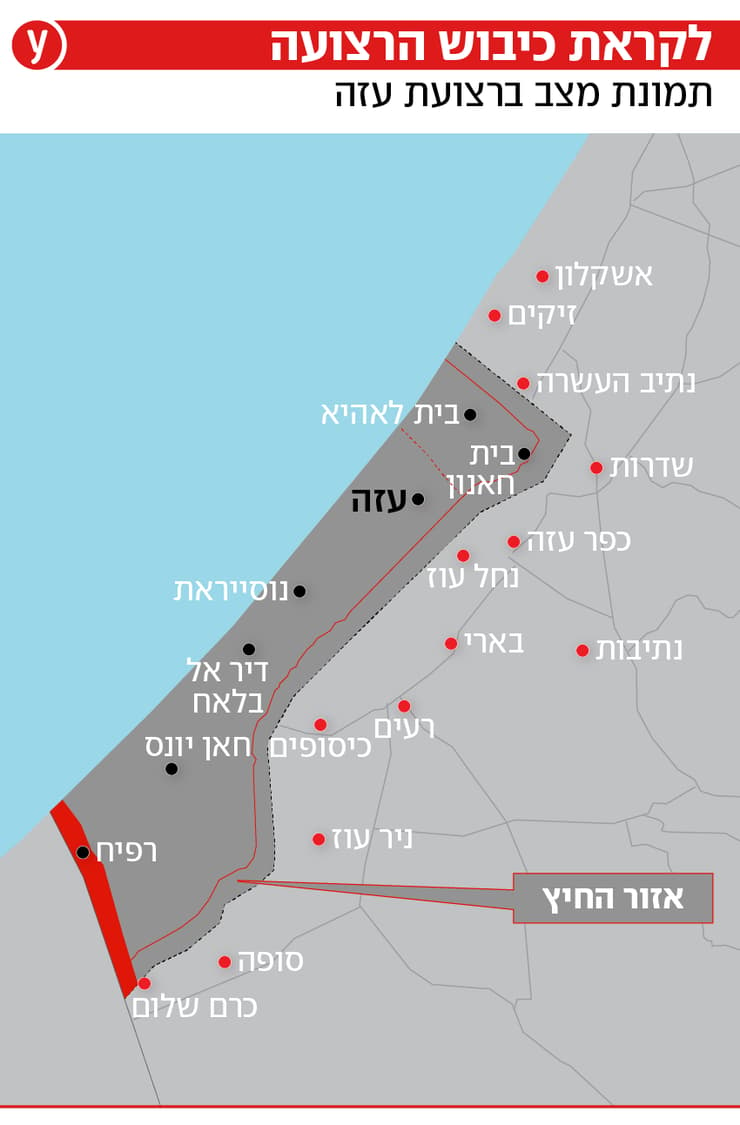
The ministers approved Netanyahu's proposal, in the shadow of sharp clashes with the Chief of Staff, who continued to warn that the operation would lead to the erosion of forces and endanger the lives of the hostages. The operation will begin with the occupation of Gaza City, the deadline for the evacuation of the population - by October 7. These are the 5 principles for ending the war that were approved in the proposal - and why was the word"occupation" left out?
Itamar Eichner
|
After a dramatic debate that lasted for hours, the cabinet decided last night (between Thursday and Friday) in favor of the full occupation of the Gaza Strip, despite the opposition of the Chief of Staff.
Eyal Zamir
For the program - and
The warnings he also voiced in the meeting
which took place starting at 6:00 PM last night. The dispute between the Prime Minister
Benjamin Netanyahu
The Chief of Staff continued the long meeting - and some of the ministers even confronted Zamir over the position he expressed.
An official announcement from the Prime Minister's Office, delivered shortly before 5 a.m., stated that"the Political-Security Cabinet approved the Prime Minister's proposal to defeat Hamas. The IDF will prepare to take over Gaza City while providing humanitarian aid to the civilian population outside the combat zones."
2 Viewing the gallery
Netanyahu's proposal was approved, despite the Chief of Staff's warnings (Photo: Dana Kopel, Shalev Shalom, REUTERS/Ronen Zvulun, IDF Spokesperson, Ahmad Hasaballah /Getty Images)
The statement noted that the cabinet had overwhelmingly adopted what they called the "five principles for ending the war": disarming Hamas; returning all hostages - both living and dead; demilitarizing the Strip; Israeli security control in Gaza; and the existence of an alternative civilian government that is not Hamas or the Palestinian Authority. The statement from Netanyahu's office also stated that an absolute majority of cabinet ministers believed that the alternative plan presented - the Chief of Staff's plan for encirclement -"will neither achieve the defeat of Hamas nor the return of the hostages."
According to the cabinet decision, the evacuation process of the population of Gaza City should be completed by October 7, as a"symbolic date." After the evacuation is complete, a siege will be imposed on the Hamas terrorists who remain in the city. The Prime Minister and Defense Minister Yisrael Katz were authorized to approve the IDF's final operational plan.
The cabinet decision did not use the word "occupation", replacing it with the phrase"takeover" - for legal reasons related to responsibility for the civilian population. However, a senior Israeli official emphasized that this is only the official definition, when in fact the intention is to occupy Gaza. The operation will be carried out in stages, with the IDF starting by occupying Gaza City. At the same time, the understanding is that Israel will stop if a hostage deal is reached.
Finance Minister Bezalel Smotrich opposed the move due to the lack of a clause that would rule out a halt to the fighting even in the event of a deal, and he and Minister Itamar Ben-Gvir also opposed approving a component of sending large amounts of humanitarian aid to the Gaza Strip. Smotrich even claimed that"if we don't decide to go all the way, the Chief of Staff's plan is better." At the same time, the possibility of a halt for a hostage deal is also not included in the official decision, and Netanyahu himself insisted that it be explicitly written that the operation will not be halted.
Chief of Staff Zamir was the most prominent and vehement opponent of the occupation plan, and during the long meeting, heated confrontations broke out between him and the ministers, which included biting and raising voices. Zamir warned of the consequences of displacing about a million Gaza residents - and of harming the kidnapped. In a confrontation that broke out with Minister Ben Gvir, the Chief of Staff emphasized that"there is no humanitarian solution for the million people we will transfer. Everything will be complex." He berated the ministers and told them: "I suggest that you remove the return of the kidnapped from the objectives of the fighting."
Ben Gvir: "We want a decision." Smotrich: "A temporary deal is a defeat"
Ben Gvir attacked Zamir in response: "Stop talking to the media. We want a decision. We all worry about the hostages, but also about the soldiers and fighters who demand victory. There are constant briefings by military officials. You are subordinate to the political echelon. Learn from the police how to obey the decisions of the political echelon."
Smotrich said for his part that "we must talk about victory. If we go for a temporary deal - it's a defeat. We must not stop halfway. We must exact a price from Hamas, they must pay a price for what they did." Minister Regev emphasized: "We must defeat Hamas." Minister Elkin noted that "the army is proposing a plan to end the fighting. This is in practice the Tash, what they are doing in Judea and Samaria. This is not war."
The Chief of Staff. Yesterday. Warned of the erosion of forces (Photo: IDF Spokesperson)
While it was decided to send additional aid to the Gaza Strip, the decision does not include the establishment of the"humanitarian city" that was proposed as a temporary solution for the Gazans. The briefings given during the discussion stated that there is American backing for the occupation of the Gaza Strip and that the US is expected to soon publish principles for ending the war and a broad aid program led by it - which will include the establishment of up to 16 food distribution centers.
At the conference that began last night, Zamir reiterated that his preferred plan is encirclement and presented the achievements of the current operation,"Gideon's Chariots," while Netanyahu claimed that the current method had failed and had not led to the release of hostages."I don't want to perpetuate Hamas. I want to defeat it," Netanyahu said in the discussion - despite warnings from the military echelon and fears from the families of the hostages that the plan he supports would endanger those who have still been held captive, after 671 days.
The Chief of Staff presented to the Cabinet his position that the occupation of Gaza would endanger the lives of the hostages and that as they entered sensitive areas, there would be no way to ensure that they would not be harmed. Zamir also warned that an occupation would cause a major attrition of the forces. Ministers present in the room confronted him about the results of Operation"Gideon's Chariots," which was launched on their orders. They claimed, among other things, that the operation did not achieve its goals. The Chief of Staff claimed that he had actually achieved many achievements - and created the conditions for the return of the hostages in a deal that was not implemented.
As stated, a large majority of cabinet ministers supported the position that Netanyahu himself ultimately chose even before the discussion, and even the arguments that were heard against the occupation of Gaza did not convince them to choose the path proposed by Zamir. The one who pressed throughout the discussion to take into account Zamir's position and oppose the occupation was Shas Chairman Aryeh Deri - who participated in the meeting, even though he is not a minister, and whose party ministers only recently resigned from the government.
The negotiating team noted at the meeting that they are receiving messages from the mediators that Hamas is softening, and there is a good chance that it will agree to return to the negotiating table in the near future. On the other hand, cabinet ministers believed that this was a biding time exercise and said that Israel must go all the way and not fall into the trap of the mediators, who, they said, have proven time and again that they are unable to get Hamas to accept a deal and are only working to save Hamas from a military decision by Israel.
Opposition Chairman MK Yair Lapid said in response:"The cabinet's decision tonight is a disaster that will lead to many more disasters. In complete contradiction to the opinion of the army and security forces, without considering the erosion and exhaustion of the fighting forces, Ben Gvir and Smotrich dragged Netanyahu into a move that will take many months, lead to the deaths of the hostages, the killing of many soldiers, cost tens of billions to the Israeli taxpayer and lead to a political collapse. This is exactly what Hamas wanted: for Israel to be trapped on the ground without a goal, without defining the picture for the day after, in a useless occupation that no one understands where it is leading."
Netanyahu's interview blitz, before the debate
The operation will be gradual and will begin in Gaza City. Netanyahu indicated that his inclination is for the operation to be reversible."Even in the operation to occupy the Strip, we can stop the fighting if Hamas agrees to accept Israel's conditions," Netanyahu told ministers. Before the cabinet meeting, Netanyahu gave a series of interviews to English-language media outlets in an attempt to explain his position, which has been sharply criticized in the West.
He told Indian journalists that he had no intention of annexing the Gaza Strip, and in an interview with Fox News he admitted in effect that the goal was to regain control of all of the Strip's territory - but not to control it. Netanyahu said the goal was to transfer the Strip to civilian control other than Hamas:"We want to transfer it to Arab forces who will control it properly. We want to free us and them, Hamas, who are holding two million Gazans hostage."
Hamas responded to the remarks, claiming that"What Netanyahu is planning is the continuation of the policy of extermination and expulsion. Netanyahu's words reveal the real motives behind his withdrawal from the last round, even though we were close to a final agreement. This proves that he aspires to sacrifice the hostages for his personal interests. Gaza will remain unconquerable. Expanding the aggression will not be a trip - its price will be heavy and expensive for the occupation and its Nazi army."








